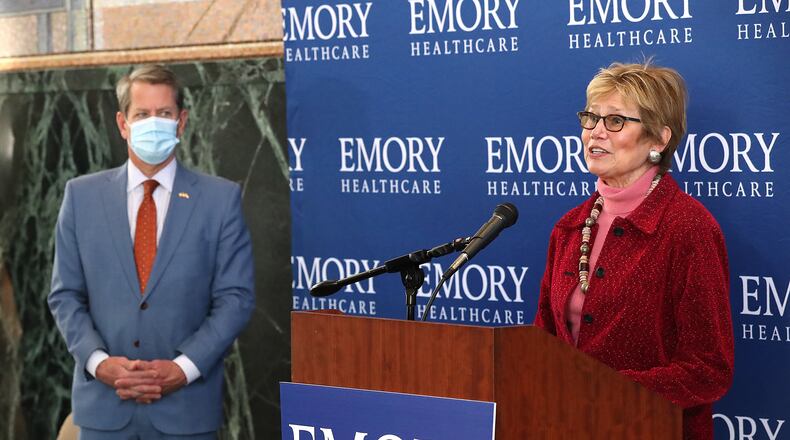As Georgia on Tuesday set another daily record of new COVID-19 cases and many hospitals were running out of beds, state officials were racing to keep ahead.
Health officials said they hope to quickly get additional COVID-19 vaccine shipments distributed throughout the state, avoiding issues that delayed deliveries last week.
Gov. Brian Kemp also said the state is reopening the Georgia World Congress Center in downtown Atlanta to accommodate 60 patients through January. He also said the state will spend about $8 million in hospital staffing support as a result of the new relief bill passed by Congress.
Still, officials urged Georgians to limit their exposure amid the grim new numbers and concerns that positive cases could continue to rise as the Christmas holiday approaches. Georgia reported 9,079 net new confirmed and probable cases Tuesday. The Department of Public Health also reported 50 confirmed COVID-19 deaths and another 14 deemed probable.
“Do not let your guard down. The threat of the virus is very real, despite the vaccine,” Kemp said at a news conference at Emory University, where the Moderna vaccine was tested.
The Moderna vaccine is the second the federal government has authorized for emergency use. The first, by Pfizer-BioNTech was given the green light earlier this month, and shipments began arriving in Georgia last week, albeit slower than expected. Federal officials later apologized for the slower rollout.
The Moderna vaccine was authorized on Friday and shipments are arriving in Georgia this week.
Some Georgia hospitals waited to receive the Moderna vaccine because it doesn’t need the ultra-cold storage necessary for the Pfizer-BioNTech vaccine.
Jimmy Lewis, chief executive officer for HomeTown Health, an advocacy group for Georgia rural hospitals, was in touch with five of the hospitals Tuesday. While one received a shipment of Pfizer-BioNTech vaccine, the other four were waiting for shipments from the Moderna vaccine, which they expected by Thursday.
Navicent Health, which has a workforce of 6,500 and serves many rural communities, received its first vaccine shipment Monday afternoon. It received 20 vials of the Pfizer-BioNTech vaccine and expects another 40 vials Wednesday. In all, the system is expecting to get 4,000 doses, some of which will go to healthcare providers in Baldwin and Peach counties.
Tanner Health System, which for weeks has been operating at full capacity and caring for a crush of COVID-19 patients, finally received its first doses of the Pfizer-BioNTech vaccine Tuesday morning.
The system, which has 3,500 employees, received about 2,000 doses, said Greg Schulenburg, the company’s senior vice president and chief information officer. Inoculations quickly began. About 1,000 more doses were expected within two days.
By 2 p.m., the first wave of 200 health care workers started being vaccinated. Schulenburg estimated about 75% of health care workers have expressed interest in getting the vaccine. “We believe everyone within the system who wants to get the vaccine will be able to get the vaccine,” he said.
Credit: HANDOUT
Credit: HANDOUT
Georgia, following federal recommendations, decided the first groups that could get vaccinated would be health care workers and people who live and work in long-term care facilities. About 582,000 Georgians fit in those categories.
According to DPH’s new vaccine dashboard, Georgia has received about 156,000 doses and 17,870 people have been vaccinated since shipments started rolling out.
DPH Commissioner Dr. Kathleen Toomey told reporters Tuesday it will be at least a month before the next group of Georgians listed in the state’s plan, which includes the elderly and police officers, can get vaccinated.
As the vaccine becomes more available early next year, many questions remain to be answered about how the doses will be rolled out. Will providers determine who is eligible among the various priority groups? How do essential workers, whether they are police officers or grocery store employees, get the vaccine? Could they show proof of employment at a pharmacy or would they need their doctor to provide it?
DPH spokeswoman Nancy Nydam said the health department is having discussions with public health districts about developing plans for notifying the public when the vaccine is available to them and the logistics of how to get vaccinated. There may also be guidance from federal authorities and input from medical associations, according to DPH.
Credit: Alyssa Pointer / Alyssa.Pointer@ajc.com
Credit: Alyssa Pointer / Alyssa.Pointer@ajc.com
Kemp and others addressed another concern Tuesday: a new strain of COVID-19 first detected a few days ago in the United Kingdom. Dr. Nadine Rouphael, lead investigator in the Emory Vaccine Center, said it’s not unusual for a virus to mutate and she is confident of the vaccine’s efficacy against the new strain.
Meanwhile, health care workers were lining up again this week to get vaccinated.
Among the first to be vaccinated at Tanner was Dr. Tim Paul, an emergency room physician who said he barely felt the shot and wasn’t experiencing side effects.
“It’s been a long, long year,” said Paul. “At I think the vaccine is the only thing that can turn the tide.”
Dr. Dominiq Okoduwa, an internal medicine specialist at Navicent, said as he received a shot he did so “to do my part to held stop the spread.”
Staff writers Carrie Teegardin and J. Scott Trubey contributed to this report.
Credit: Curtis Compton / Curtis.Compton@
Credit: Curtis Compton / Curtis.Compton@
Keep Reading
The Latest
Featured




